#loosely inspired by actual events of this evening (me having to kill a spider for my wife)
Explore tagged Tumblr posts
Note
48- rampage 💕
“It has not moved in days, Daniel.”
“He’s luring us into a false sense of security! He’s plotting a spidery rampage as we speak—I can see it in his eyes.” Daniel is glaring at the tiny black smudge that’s taken up residence where the wall meets the ceiling of their living room. He’s pulled his bare feet up onto the sofa underneath him, like he’s expecting the spider to launch itself at his toes.
“You do not know it is a boy spider.” Max says because he knows it will make Daniel squawk indignantly. It is a cute sound he makes.
“Boy I know it’s a spider!” His lovely expressive face morphs into an exaggerated pout. “Kill it for me, Maxy.”
“You are from where they have giant dog-eating spiders and you are afraid of this thing?” Max is shaking his head in mock disappointment even as he’s pulling the step stool out of the closet and ripping off a piece of paper towel.
Daniel blows him a kiss.
#ask#my fic#maxiel#this was a fun little exercise in trying to write dialogue 🫡#loosely inspired by actual events of this evening (me having to kill a spider for my wife)
66 notes
·
View notes
Text
Headcanon
Semi-related tidbits on Heaven’s Door, Rohan’s isolation, obsession with reality, Pink Dark Boy, Koichi, interpersonal relationships. (warning: this is long)
You know how, at first, Araki said Rohan got his Stand after being pierced with the arrow during DiU, but then later on in Rohan at the Louvre he’s shown being adamant on not using his power to read people on Nanase back when he was 17? Yeah... lemme expand on how I see it.
He developed the power way before the events of DiU, but he had no idea what it was, or how to use it properly. Back then, it wasn’t even a Stand as we know them, just a latent power gradually getting developed in his subconsciousness, as his passion for using art as a form of authentic self-expression grew. He had no control on when and how to use it--it would just... sort of happen, mostly whenever he was really interested in someone/something--kind of like with Nanase, since, at that point, he was starting to get really interested in women and growing aware of his sexuality. (Also, she showed him kindness and genuine interest, which he craved back then--more on that at some other point, probs.) He legit thought he was insane and hallucinating the first time his powers happened and he never told anyone about it, because he didn’t want to be ostracised even more than he already was. Eventually, he accepted it as proof that he was special, meant for great things, and superior to all those who undermined him.
Oh, wait-- what’s that? People undermining, ostracising the great Rohan Kishibe? That was a thing? It’s more likely than you think.
Prior to getting famous, Rohan didn’t have a lot of life experience. For one, his childhood is an ominous big black hole in his memories, and he was homeschooled for the majority of it--by some very strict tutors, chosen by his parents... until he drove off every single one of them. The little time he spent in a more public, yet respectable educational environment as a teenager, he didn’t seem to fit in, as he didn’t know how to behave, what to talk about, how to react to things happening, what was acceptable, what was not. Not that he had anyone to talk about these things with, since his parents were always too busy, and he didn’t feel like talking about it with some unhelpful therapist. He was so sick of those. Many of his peers were quick to brand him a weirdo and avoid him, if they didn’t outright mock him about his shut-in lifestyle, his appearance, his interests--anything at all, really. Admittedly, it stung to be treated that way, but he didn’t want it to be obvious, so he shielded himself with displays of arrogance and lack of care for their opinions, which later escalated into an impressive amount of narcissism. It only made those same people resent him more, but they mostly left him alone... save for the few who saw through it and kept on provoking him. Once he’d finally had enough, he went off on them so hard that he almost got punched in the face and caused an incident that almost got him expelled, if it weren’t for his parents meddling in to pull some strings. (Ironically, Rohan would later on drop out in his final year, and cut out all contact with his parents. Whoops. More on his relationship with his parents at some other point)
He showed no remorse at all for his actions, which earned him both fear and respect from various individuals. He was sent to some more psychologists who didn’t help (always telling him what to think, believe, feel, as if his way of perceiving, existing wasn’t valid--which prompted his own interest and interpretation of various psychological phenomenoms), made to do extra work that only further goaded him to misbehave--nobody ever seemed to listen to him, or put an effort to understand where he was coming from. All they seemed to care about was shaping him to fit into a mold he never even wanted to fill, so he grew very resentful and mistrustful of people trying to butt in on his damn business. Feeling helpless in escaping this constricting reality, he’d often escape to his own, alternate reality, which kept him same throughout all these life’s trials. The world of Pink Dark Boy. He didn’t remember when he first came up with the character, or the world, or the story, but he had a feeling it had always been a huge part of him... and, at some point, he decided he wanted it published, revealed, shared with the world. And when Rohan Kishibe decides he really wants something... he doesn’t falter.
The earliest chapters of his work are very grimdark and edgy, because that’s how he felt while making them. Very authentic, and gut-wrenching, and believable, and terrifying and intriguing--was how the critics described it later on. Yet... there was only so much inspiration he could draw from his own experience, and retain this flattering reputation without circling around the same subjects, themes he was familiar with over and over again. At that point, he went off the rails a bit, and let his curiosity, need to know, to learn, loose far more than was wise, because he wanted to rapidly, almost forcefully, gain experience, knowledge, skill just so he could keep up with his work, and the supposed demands of his new fans (actually, his own impossible standards and demands). It worked, for a time, before he was burned out to the point of nearly losing his mind--which brings us to the events of DiU, when on a fateful whim he decided to move to Morioh, in an attempt to reconnect with his unknown childhood self, find peace, regain his mind in a town much smaller than Tokyo, where he’d lived most of his life... only to be stabbed by an arrow (possibly at his own request... lmao), and fully awaken Heaven’s Door.
It felt so, so validating to finally have a name, and an explanation for this power, however vague it was. And when he realised that he could control it, and the possibilities that such a power opened? He completely fucking lost whatever common sense he had in his euphoria, which explains his extreme behaviour when he first met Koichi (willingness to alter his memories, kidnap him, kill him, also licking that fucking spider and punching himself in the face and JUST. EVERYTHING). If he couldn’t use his own limited knowledge of reality, he would steal it from whoever he deemed worthy, interesting, moving, etc--and Koichi’s pure, unrelenting kindness and courage and willpower was so, so wonderful, beautiful, worthy, inspiring to Rohan, which is why he latched onto the other so intensely. I believe this weird, weird friendship was very unhealthy at the beginning because of how needy and demanding Rohan can be and how much of a pushover Koichi can be, but later on Koichi figures out how Rohan works and how to put him in his place. It’s simple--once you have Rohan’s respect, he’ll submit and own up to his behaviour if you call him out on it. Kind of like at the end of DiU, when Rohan made fun of Reimi and acted all tsundere during their goodbyes, until Koichi gave him That Look and Rohan confessed his true feelings. He just... he really admires, respects, trusts Koichi. He feels it in his guts it’s safe, right to do so. He relies a lot on his gut feelings, because they rarely fail him.
Koichi was probably Rohan’s first actual friend--not that he never had any meaningful relationships before, they just never stuck around long enough because Rohan never felt the need to invest himself too much into maintaining anything with anyone. He’s just very picky. In the rare event that he did try, it wasn’t reciprocated, or he just lost interest after finding one (1) flaw he didn’t like. He was just fine being on his own, doing his own thing, before hanging out with Koichi, stalking him observing his interactions with others and the world around him awoke inside of Rohan the wistful need to connect with someone on a deeper level. The need to experience genuine friendship, understanding, trust, giving something away without demanding something in return, looking past one’s flaws and accepting them, and allowing himself the vulnerability of it going both ways. All very, very foreign things, ones he’d convinced himself he was above experiencing, but a necessary part of being happy, fulfilled, real--something Rohan had missed out on in his life-long state of self-absorbed isolation--both forced and self-imposed.
THERE IS SO MUCH MORE thoughts I have on all of these subjects and I’ll probs elaborate at some point but I think this is enough for now lmfao bye. To end things, allow me to present one of my fave Rohan panels which kind of inspired all this
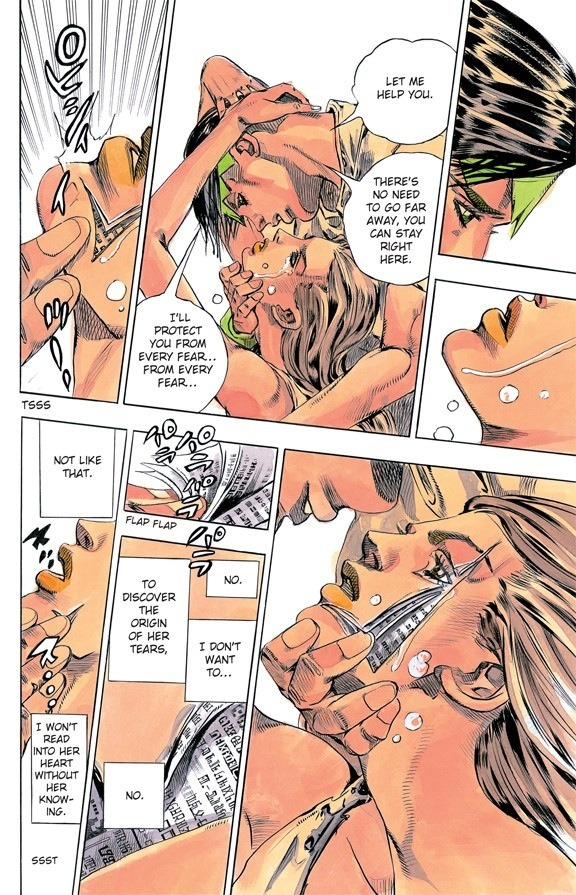
Rohan in love? Did you mean: yet another thing I’ll probs write about at some point
#here have this word vomit that might or might not make sense. idk. just here it is#hc : you may not like my integrity
4 notes
·
View notes
Text
Spider-Man: The Darkest Hours Thoughts
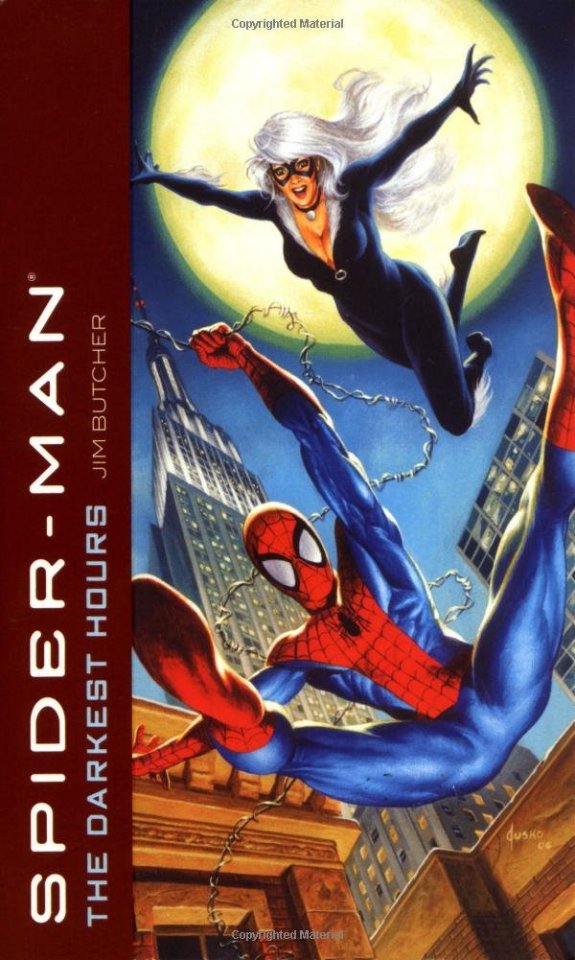
Many years ago I was contacted by someone who recommended this novel to me and others from a Mary Jane fan point of view. You can read the recommendation here.
Whilst I own the novel and started it at least twice for whatever reason I stopped reading it before the start of the first big action set piece. However since Dreamscape audio released the novel on audiobook I’ve finally been able to experience it for myself.
So how’d it fair? SPOILERS ahead
I don’t usually do this these days but because this story is relatively obscure I’m going to provide a synopsis. Or more accurately marvel.wiki is:
“Even though he is a chemistry teacher, Peter Parker has now been forced to be a substitute basketball coach over at Midtown High where he works. His ineptness soon negatively draws the attention of basketball star Samuel Larkin, who challenges Peter and refuses to cooperate with his own teammates. Going over the player's records, Peter soon discovers that Larkin has not taken all of the required vaccines needed to play at the school, which will mean his automatic expulsion from the team for the remainder of the season, as well as dwindle his chances of getting a scholarship to a good university.
After a long day of coaching, Peter returns home and discovers that Mary Jane has won a part as Lady Macbeth in Shakespeare's Macbeth. However, the play is held in Atlantic City, so in order to compensate for the long drive, MJ bought a car despite not having a driver's license, let alone any idea how to drive. They began discussing whether or not Peter should teach her. In the middle of the talk, however, the Rhino attacks Times Square, so Peter leaves to go fight him as Spider-Man.
While on the way there, Spider-Man runs into Black Cat, who claims the rampage is a trap and that Peter should not go. He ignores her warning, though, and continues to head there. Peter easily defeats Rhino, knocking him unconscious in the process. Just as he does, however, the siblings of Morlun - Thanis, Malos, and Mortia - appear. They blame Spider-Man for their brother's death despite the Other being the true person who ripped his throat out, and now want revenge by killing him. Spidey initially flees, but with the help of a SWAT team and Black Cat he eventually takes them on (he also seeks help from Doctor Strange but is declined, with Strange asserting that his interference would harm the cosmic balance). Mary Jane comes to the fight scene and becomes jealous that Felicia is able to help Peter fight the siblings, as well as how the siblings are treating her husband. Enraged, she takes her car and runs Morlun's siblings over, distracting them and giving Spider-Man the time needed to banish them to a barren netherworld using three trinkets Strange had secretly arranged to be given to him.”
Let me get some admissions out of the way.
a) I’ve not read a ton of Spider-Man/comic book based novels, although I own the majority of the Spider-Man ones that Wikipedia claim exist. I dunno why, I just never manage to get around to them for whatever reason. Perhaps it’s because comic book superheroes being designed for a visual medium which so often emphasises action makes the jump to prose (or in this case audio) difficult. Indeed I must admit when reading/listening I do zone out a bit when action scenes occur.
b) I’m not familiar with the work of Jim Butcher although I hear great things
c) I’d actually forgotten the specifics of the recommendation for this book. I just remember it was recommended and it was because it should feed the MJ fan/shipper in me and others. Forgetting this was lucky actually as it allowed me to enjoy some aspects of the books I’d otherwise have not been surprised by.
Let’s also get the technical aspects out of the way since this is an audio book I am discussing.
The narrator, Jack Meloche is...okay...mostly.
I find his performance of Peter a little too nasaly and early on in the audiobook you do have to kind of power through his performances of Mary Jane and especially Felicia. By the end of the story I grew to tolerate them but never love them. Hearing a grown ass man do his best to convey a sultry kinda sorta femme fatale can be a bit cringe inducing I must admit. His best performance is as the Rhino though.
Other things you should know is that this novel is loosely in continuity with ‘Spider-Man: Drowned in Thunder’ (which I talked about here),
https://hellzyeahwebwieldingreviews.tumblr.com/post/140091613524/spider-man-drowned-in-thunder-my-thoughts
another novel from the same range of books. It was published and is set after the events of this novel and both are set chronologically during the J. Michael Straczynski ASM run prior to Spider-Man joining the New Avengers.
I’ll be upfront with you I found ‘Drowned in Thunder’ to be better for the most part and downright ingenious. It did not however use Mary Jane as much or as critically as this story. She was important but didn’t have as big of a role as she does here. Does that make one novel better or worse than the other? Neither, they’re just different. It’s healthy to mix up the emphasis certain supporting characters get after all.
Looking at ‘Darkest Hours’ on it’s own merits for the most part it nails the characters in terms of the sentiments but my personal problems with it are in the presentation at times. Not even all the time just some of the time.
Let me put it more clearly.
There is exactly one scene featuring Aunt May, specifically a phone conversation. And this phone conversation progresses into a very involved inspirational speech from May to Peter about how awesome he is as a person/hero and the scene’s drama stems from the fact that Peter might be fighting his last battle soon after this. Are the sentiments Aunt May expressing in character? Of course. Are these things she would say? Yes!...but...I felt it was kind of...off that her one scene in the whole story is her showing up and giving the most involved inspirational speech Spider-Man has ever gotten from her or anyone else. Spider-Man 2’s backyard scene was tame by comparison. I just feel it would’ve been better for May to have both featured in some way prior to that scene and for the speech to have been dialled back a bit.
Much more relevantly though is the book’s handling of Peter and MJ’s relationship.
Throughout the novels there are scenes of Peter and Mary Jane being very much in love. The most common way this is expressed is via Peter complimenting Mary Jane in his head.
Would Peter feel this way about Mary Jane. 100% yes! But...I don’t know if it was the vocal performance, the fact that we have this back in the comics now, or really JUST me but personally I kinda...cringed a bit.
I’m not saying it’s bad!
I’m not even saying it could be better!
I’m sure there are many readers who adore this.
I’m not well versed in romance fiction so maybe I’m missing something here and actually it’s perfectly acceptable or great writing.
I’m saying just for me personally again...I’d have wanted it dialled back. It just got a little much, a little cringey for me personally.
But you know that happened sometimes in the JMS run which I loved and agree with everyone else wrote the marriage better than it has ever been written.
Speaking of Straczynski we really need to talk about his Spider-Man work.
Commonly original Spider-Man novels (i.e. not novelizations) that are trying to vaguely present themselves as being canon (so we aren’t talking about stuff like ‘Hostile Takeover’ set in the Marvel Gamerverse) try to have synergy with the status quo of the day or a very recent one.
This novel is no exception. My research tells me it was published in 2006 and whilst it’s not reflective of the then status quo of the comics where Spider-Man was unmasked and a member of the Avengers, it is reflective of the dominant status quo immediately preceding that which ended circa 2004-2005.
To refresh your memory that involves Peter being a teacher at Midtown High, Mary Jane being an aspiring stage actress who recently reconciled with Peter, and both Aunt May and Black Cat knowing his secret. To drive the point home about just when this novel is set there is an entire dialogue exchange discussing the idea of him hypothetically joining the Avengers. A discussion that in my eyes throws some wonderful shade at the idea.
This is the same status quo that ‘Drowned in Thunder’ was set during but ‘Darkest Hours’ hardcore embraces this status quo in a way ‘Drowned in Thunder’ never did. ‘Drowned in Thunder’ if anything drew more from the Paul Jenkins PPSM run than JMS’ run and exempting Aunt May being in on the secret felt like with a few changes it could’ve exorcised every other element of his run. Peter’s teaching job was a factor in the story but it was used as a brilliant and organic segue way into a Bugle/Jonah centric investigation.
‘Darkest Hours’ though...doesn’t do that.
Rather it is practically a lost arc from JMS’ run. No, not his ‘era’ wherein we’re talking about every title during his time in charge. I mean that if this was a comic book story it could’ve been straight up slotted in directly before or after ‘Sins Past’ and no one would’ve batted an eye.
The way the story tries to handle Peter’s marriage to Mary Jane, Peter’s teaching job, the inclusion of Doctor Strange and Dex, the potted history of Ezekiel, the direct references to Shathra and friggin ASM #500, and of course Morlun’s siblings. This FEELS like the JMS run!
And for a lot of people that’s going to be a huge deal breaker for this novel.
In my experience of Spider-Man fandom whilst there is a lot of appreciation of JMS’ run it was divisive for various reasons. A lot of people just for whatever reason turned off by Peter being a teacher (or more accurately not being a photographer for the Bugle) and recoil even more over the presence of mystical elements like Morlun or Doctor Strange.
Now if you liked or tolerated that stuff then this novel is a hidden gem of sorts, whether you want a shot of nostalgia or just found that stuff compelling.
Me personally, I liked the first half of the JMS run for the most part. And Jesus Christ looking back at it after what we got after he left it’s a Hell of a lot better.
Say what you want about Ezekiel and Peter being a teacher but I’d take that stuff over fucking Superior Spider-Man and Parker Industries!
Of course the elephant in the room regarding this novel in the modern day is that it predates Spider-Verse and Spider-Geddon as stories establishing Morlun had a family.
And...did...it...BETTER!
In Spider-Verse/Geddon Morlun was the main character and his family had unbearably simplistic personalities that boiled down to being variant action figures of him!
Now don’t get it twisted. Mortia and her brothers are a million miles away from the greatest villains in Spider-Man history. In fact they have LESS personality than Morlun did.
And yet in context this actually works for the story more effectively than in Spider-Verse/Geddon.
Morlun as originally presented was essentially a very eloquent predator and a hunter, not quit a full on force of nature but close to it. He was intimidating because he really didn’t do anything besides hunt Spider-Man and want to eat him.
Where Spider-Verse/Geddon failed was in reintroducing Morlun and then immediately watering him down by having him appear alongside his variant action figure family with moments and even back up stories told specifically from their POVs. Sure JMS gave us moments focussing on Morlun’s character outside of Spider-Man or Morlun, but they existed to introduce the character and briefly build him up before we realize just how utterly outclassed Spider-Man is against him. When we already know who the Hell Morlun is we don’t need scenes focussing upon him because he isn’t a character who can support that level of attention. Nor should he be because he’s SUPPOSED to be a one not hunting and killing machine basically.
That’s why this novel makes better use of ‘the Ancients’ than S-V/G made of ‘the Inheritors’. We don’t have scenes from their POV thus they can basically be what Morlun was when Spider-Man first met him. Ruthless predators on the hunt, except now there are three of them so Spider-Man is truly screwed!
The plot cleverly focuses instead on the characters who have to DEAL with the impending threat the Ancients pose rather than trying to pretend these guys have actual characters. Butcher also makes them much scarier than the Inheritors because rather than monsters who basically just port in wherever and kill indiscriminately, the Ancients have riches and resources. They are a part of society and Peter is racing against the clock hoping those resources don’t zero in on who he is and where his family lives. This dread, this tension is delectable and far more effective than what Slott of Gage ever did. It helps that we actually see Peter reacting believably to the pressure and stress of his potential demise rather than be a generic and passive as he was in Spider-Verse.
Also the fact they appear alone rather than alongside Morlun is better too as it means Morlun doesn’t look less unique and they look less like variant action figures.
Additionally Butcher does a great job fleshing out the backstory to the Ancients, helping to integrate them well into the established Marvel Universe, developing their abilities and how they worked. Hell he even remembered how they were supposed to work as JMS defined them rather than how Spider-Verse and Spider-Geddon just ignored these abilities and did whatever they wanted. For instance Butcher establishes clearly the Ancients CAN feed off of life forms other than Spider-Man as opposed to S-V/G just having them do that with no explanation and feed off of just anyone. Butcher also remembered Morlun saying that eating Peter would sustain him for a looooooong time and incorporated it into the plot. Similarly he provided a clear explanation for why Spider-Man couldn’t simply use the same trick he used against Morlun again (because he’s outnumbered!) or get help from other heroes like Doctor Strange. Speaking of which we got one of the best ever explanations for how magic works in the Marvel Universe ever. Wasn’t expecting that nor for Wong to be so delightful!
The only real misstep Butcher makes as far as the Ancients are concerned is the idea of the Rhino being a potential snack for them when he never got his powers from a real rhino or anything like that. He was even referenced as one of the pretenders to totem powers by Ezekiel. I guess you could that the Lizard (who was also referenced) should count so...whatever the rules aren’t clear here.
Let’s leave our main villains behind and talk instead about our more grey characters.
So yeah...Jim Butcher wrote one of the all time great Rhino stories here!
Again wasn’t expecting that!
The Rhino in Aunt May’s home breaking bread with Spider-Man is so insane an image that you’d love it for the absurdity alone, but Butcher makes it totally organic. He also keeps Rhino in character (with the exception of a time he refused to kill Spider-Man which I don’t remember being a real story) and fleshes him out rather wonderfully. He draws some great parallels between Rhino and Spider-Man and frankly the scene where Mary Jane is literally shaking with laughter over these comparisons is unquestionably the highlight of the whole novel!
What was really great was that Butcher didn’t change the Rhino or compromise him. He’s still a mercenary, he’s still not really a good guy, but he’s more human. He doesn’t like Spider-Man, he wants to beat him, but he also on a certain level respects him.
It’s just expertly done!
Then there is Felicia. Had Spencer not already fixed Felicia this story would’ve ignited fury within me. Not because this was bad but rather that this story used Felicia so wonderfully that BND and Slott’s ruination of her would’ve stung all the more.
Felicia is purrrrrrrfect here!
Not quite good, not quite bad, sultry, catty, territorial, smart, aggressive, dangerous, loyal. Butcher NAILED her character!
The fact he uses her to open up a philosophical debate about the differences and moral justifications between Peter, herself and the Rhino is inspired. There are differences but the lines aren’t as clear cut as Peter treats them as. In a sense he really does have a bit of a double standard in regards to her and everyone else. This isn’t the only time Butcher brings out Peter’s flaws very well. The scene where Peter has momentary lapses into light machismo are well done. Spider-Man is a hero but he ain’t perfect that’s why we love him!
This brings us to Felicia and Mary Jane. Sorry...I love it. Maybe it’s problematic, maybe it’s problematic that I do love it...but I just do.
Okay from a strict continuity point of view Butcher puts MJ and Felicia at greater odds than they really should be. By this point in time there were tensions but there was also friendship. Truth be told Butcher puts that friendliness in there but only at the very end of MJ and Felicia’s arc together and the resolution to the tensions are off-page. And yet...what can I say the pure soap opera of it was fun for me on a very base level. Who says marriage is free of tension again?????
The peak of my enjoyment was when the pair were just unrestrained hurling insults at one another. Again, shallow I know, but it was just fun for me and I really loved Peter having to step up and be the grown up in that situation and coldly let everyone know where they all stand. MJ doesn’t get to talk to Felicia that way because she’s their friend. Felicia doesn’t get to talk to MJ that way because she’s his wife.
This brings us to Mary Jane herself. Apart from again the romance stuff for me personally going a bit too far she’s mostly done very well. She’s supportive, she has a subplot of her own dealing with a real life problem (learning to drive), she makes mistakes, she’s great at analysing Peter, and helping figure things out via being a confidant. Oh and she totally saves the day at the end. No straight up she does. If not for MJ the day would’ve been lost and Spider-Man would’ve been dead.
It was such a baller as fuck scene I am slightly pissed off that it wasn’t realized as a comic. Her throwing shade at Doctor Strange was also priceless.
The final thing to mention is the subplot involving one of Peter’s students.
I am once again going to draw comparisons to both the JMS run and ‘Drowned in Thunder’ as they are apt here.
Okay basically strictly speaking the subplot regarding Peter helping one of his underprivileged kids retain a spot on the basketball team was a weak spot of the storytelling. Not because it was necessarily bad (though a 30something trying to write ‘inner city youths’ leaves something to be desired) but because it really didn’t tie into the main plot all that much.
In ‘Drowned in Thunder’ Peter’s teaching job was integrated seamlessly.
But in this you could tweak the novel and exorcise the whole subplot. It’s relevance really is mostly thematic (Peter and the kid both need to embrace team work to succeed) and to illustrate character traits of Peter Parker. He’s so responsible he would still make time to help out this poor student even whilst his life is potentially ticking away. Nor will he abandon this kid to save his own skin, even though the kid’s physical life might not be endangered at all if he did.
Now that all being said I LIKE the subplot’s inclusion. Not only because it does demonstrate Peter’s character and the lesson he needs to learn for this story, but because I view it as part and parcel of this book’s mission to be a lost JMS story.
Really the subplot could’ve been one of the handful of stories told during the JMS run concerning Peter helping out his impoverished students. If viewed as part and parcel of trying to capture the ‘flavour’ of the era the subplot succeeds.
Finally I must say I loved Peter’s words of defiance before his possible demise.
Over all I’d say this was a very strong story. Okay, as an over all package not quite as good as ‘Drowned in Thunder’ but still up there, with moments and aspects that are as good if not superior to the latter.
Highly recommended.
P.S. I can’t believe we got development and a great use out of Dex of all the obscure characters out there!
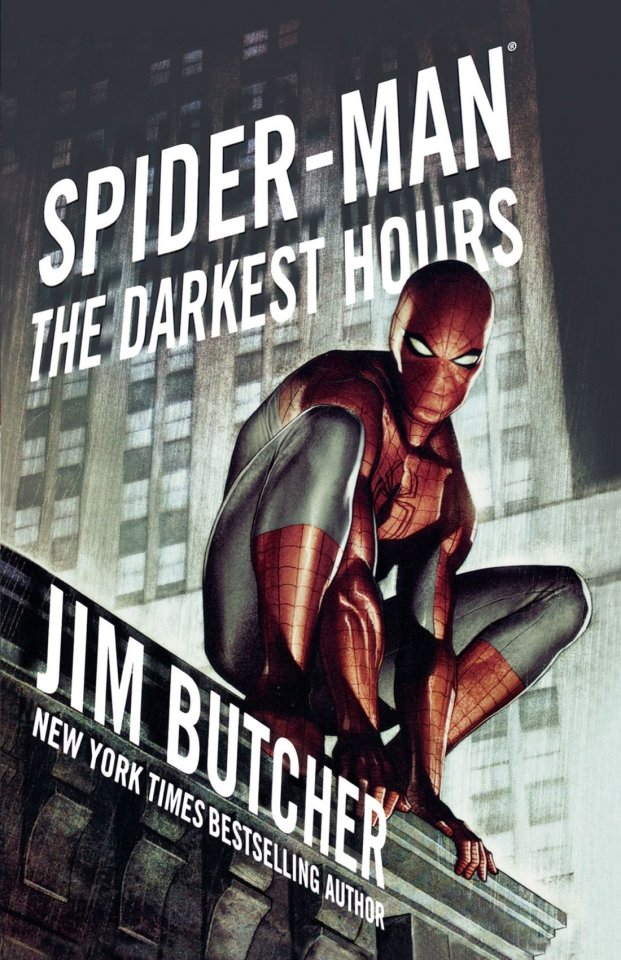
#Spider-Man#Jim Butcher#Morlun#j. michael straczynski#black cat#Felicia Hardy#the black cat#mjwatsonedit#Mary Jane Watson#Mary Jane Watson Parker#mj watson#rhino#the rhino#Aleksei Sytsevich#Alex O'Hirn#Peter Parker#Spider-Verse#Spider-Geddon
13 notes
·
View notes
Text
Eragon Movie Recap Part 4: Great Responsibility
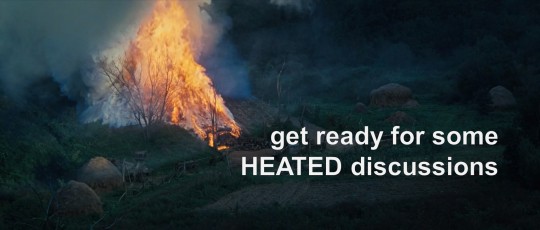
So. Much. Arguing.
We pick up where Part 3 left off. Saphira’s big. Eragon is taking inspiration from a story Brom told about dragons. Brom himself is being disruptive. The Ra’zac are on the loose, hunting for the new Rider.
Under the cover of darkness, Eragon sneaks into Brom’s house. Does some snooping. Opens a book. There are fancy metallic dragon figurines on the cover. Eragon finds a page with a griffin picture, and stares at it as though it were informative. I would like to take this moment to remind you that Book Eragon is confirmed to have been extremely illiterate at this point in the story.

Brom isn’t too happy about being snooped on by some snot-nosed kid. Grumpy, he decides to perform a jumpscare. Eragon doesn’t care. He’s busy asking unsubtle questions about Brom’s dragon story. Brom isn’t feeling very welcoming, so he tells Eragon to put his head in the dirt.

Confusingly, Brom also makes a point of stating his philosophy of “better to ask forgiveness than permission”. That’s a bit of a mixed message in this context, and Eragon immediately tries to exploit it. I wonder if it’ll come up again. Regardless, Eragon doesn’t like Brom’s attitude, so he tries throwing insults at the problem. After a bit more arguing, he finally leaves.
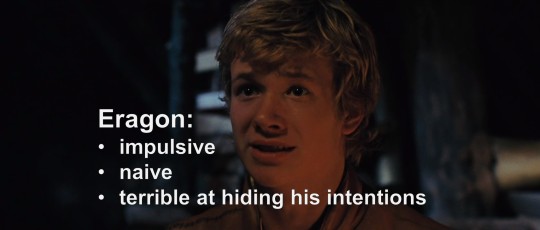
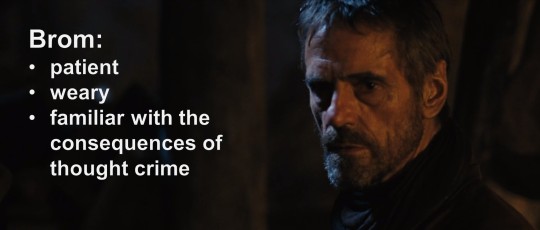
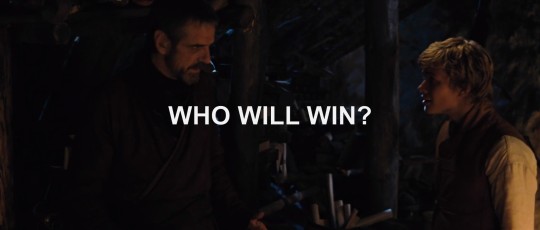
Alone at last, Brom takes a few moments to ponder. Resolving to take some sort of action, he digs out a bundle of unusual belongings and retrieves a suspiciously coloured sword.
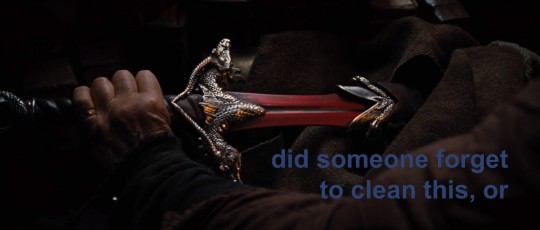
As he walks through the town at night, Eragon hears some weird noises. This is strange; the town is fairly deserted, and what people he does see appear to be in something of a hurry. He tracks the sounds to their source. Through gaps in a wall of the offending building, Eragon sees Sloan being threatened and hurt by the Ra’zac. They want information, and what luck! They found the one and only person who would know!


Sloan tells the Ra’zac how to find Eragon. Unable to pull a cardboard box out of thin air to help him complete his stealth mission, Eragon settles for hiding under a table just in time to avoid being noticed.


As soon as the threat passes, Eragon runs home so he can stop the Ra’zac from finding his uncle. Along the way, Saphira picks him up and flies off into the sky so that she can stop the Ra’zac from finding him, instead. Eragon is displeased by this change in plans. They argue for a tense few moments, and high-altitude shenanigans ensue.
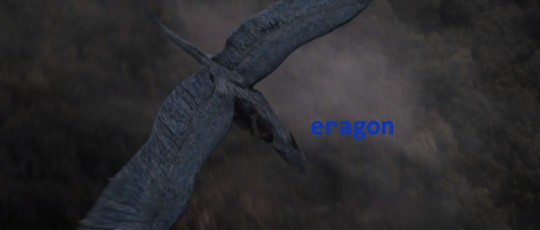


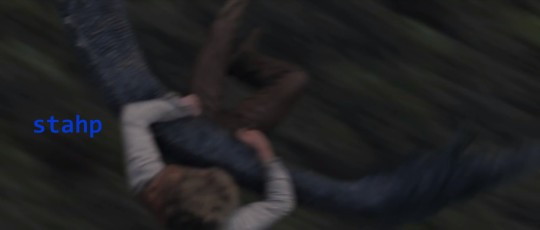
Saphira calls Eragon out on his stupidity but eventually concedes, dropping him in a haystack beside his house. But it’s too late! Garrow has been Uncle Ben’d. Eragon blames this development on Saphira and sends her away. She obliges in a huff as a thunderstorm brews up in the distance.

After a few seconds, Brom walks in. Upset, Eragon tries to attack the newcomer, but he is very promptly subdued. Brom sees Eragon’s weird hand scab and deduces everything immediately. He seems surprised, displeased, and more than a little offended that this guy is the One Rider To Save The Land.

Brom sets his feelings aside and works to resolve the current crisis. Eragon is having none of it, and won’t listen to Brom any more than he listened to Saphira. Not one to be so easily defeated, Brom isn’t having any of Eragon’s own excuses, either. He wants to bury his uncle? Well, since the uncle is inside the house, how about we burn the house down? Problem solved! Not equipped with sufficient retorts to combat arson, Eragon lets Brom drag him away.
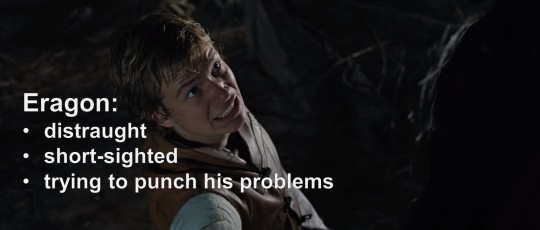
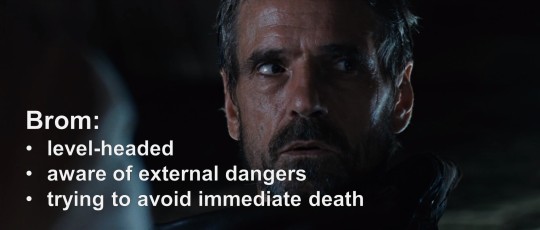
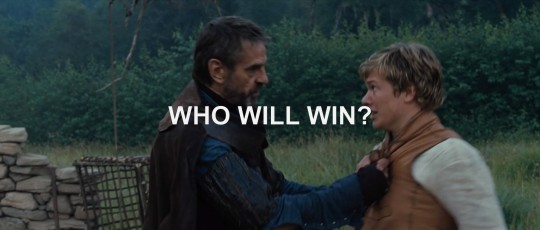
As the storm breaks, Eragon wants to know why he should even trust Brom with his safety, much less his dragon. Brom doesn’t want to tell him. Eragon does not win this argument.
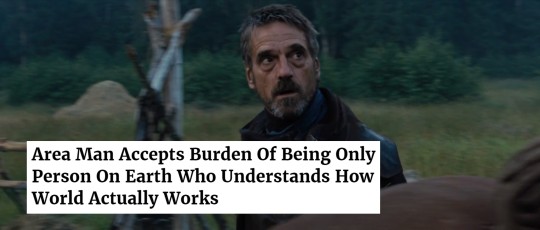
By the time they stop, they’re in the middle of the forest, and it has long since stopped raining. Eragon is very tired from riding his horse. When questioned, Brom shows that he subscribes to the “because I said so” school of reasoning. Eragon, still miffed at being forcibly prevented from helping his uncle, decides to stir up another verbal fight.
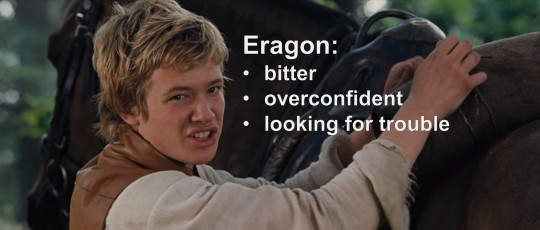
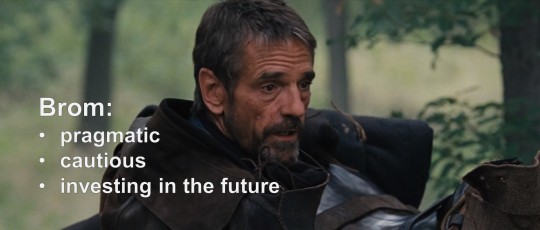

Brom tries to impress upon Eragon the magnitude of the threat they just escaped. Eragon insists without so much as a second thought that he could have killed the Ra’zac himself and then had time for tea. Brom, a professional nonsense dealer, handles all of this masterfully, but his use of silly things like knowledge and logic is no match for our hero. The discussion eventually escalates into a proper argument: in a fight between Eragon and the Ra’zac, who would win? Everybody place your bets!
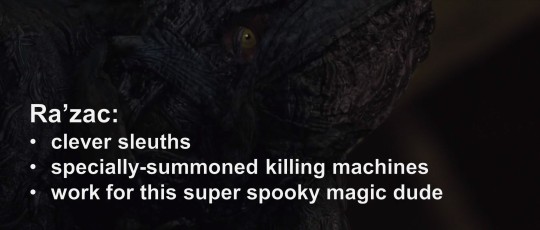
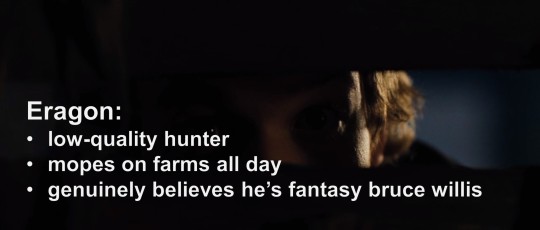
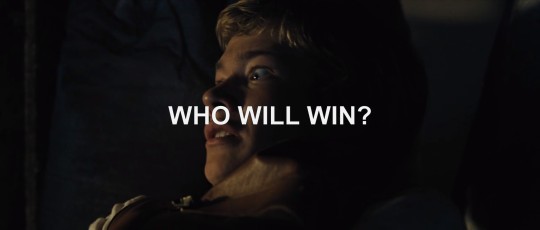
Through everything, Brom maintains control of the discussion until he makes one small error: he cites Eragon’s age as a source of weakness. This itself isn’t a mistake; younger people are generally less strong, less experienced, less trained, and so forth. All disadvantages in a fight against magic assassins. The actual problem is with the number Brom guesses. Exuding a strong sense of “this is the most disgusting and offensive thing anyone has ever said to me in my entire life”, Eragon forcefully informs Brom that the correct number is, in fact, seventeen, rather than the suggested fifteen or sixteen. This is another book inaccuracy - Book Eragon had his sixteenth birthday during events of the first volume.
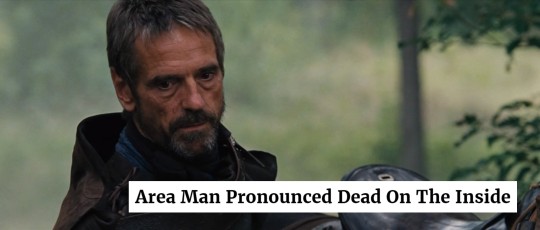
Carefully abandoning the topic of age, Brom tries a different angle. Apparently, the Ra’zac aren’t even the real problem. That particular honour belongs to some guy named Durza. Determined to avoid learning anything from people who are clearly more experienced than he is, Eragon resolves aloud to go beat up Durza instead. Explaining that Durza is a Shade, Brom finally crosses the argumentative finish line. One does not simply go beat up a Shade.

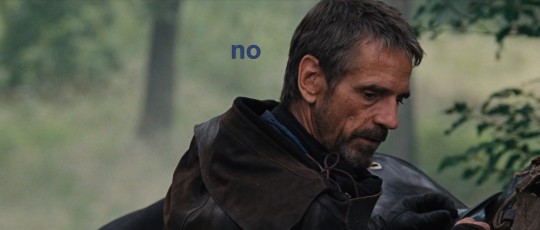




Ready to take a risk, Brom decides to introduce the topic of the Varden, those feisty rebels, insisting that he and Eragon pay them a visit. Unfortunately, this was a poor risk to take, and Eragon insists that Brom tell him how he knows all of the Varden’s juicy deets. Cornered, Brom admits to having been a feisty rebel himself, once upon a time.

Brom asks Eragon to call Saphira. Since agreement must by this point be punishable by death, they have a quick spat about instating a no-lie policy, before Eragon deigns to comply. Saphira promptly reveals that she never actually left. If you forgot that this separation happened, I don’t blame you; it was barely mentioned, and according to runtime it only lasted 6 minutes. Together once again, Eragon and Saphira reconcile. Saphira seizes her opportunity to growl at Brom a few times. Finally introduced to the dragon, Brom makes a rather knowledgeable appraisal of Saphira’s physical state, which fails to impress her until he ends it with an unambiguous compliment.
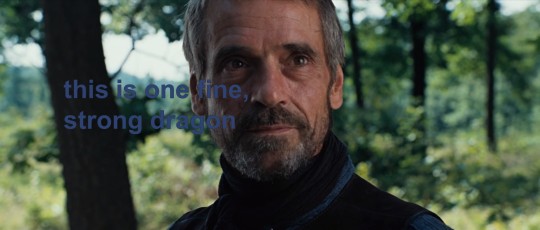
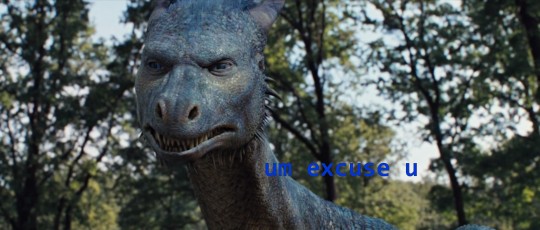
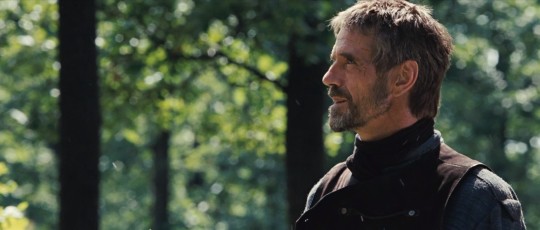
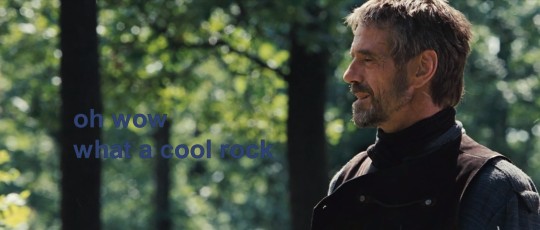
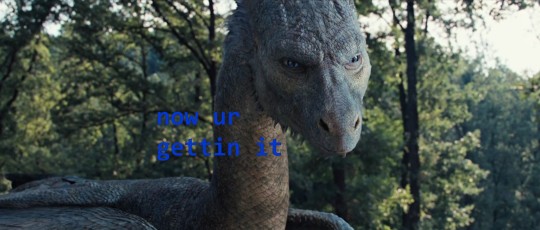
In case we might be getting anxious waiting for our next infodump, it is once again exposition o’clock! Eragon has resolved to never ride his dragon again because of that action’s connection to his uncle’s death. Brom starts up a discussion by playing the destiny card. In a brief moment of sense, Eragon remembers that he didn’t ask for any of this drama. No dragons, no murder, no Shades. But there’s no escape - the king is hunting him now. Apparently, Galbatorix wants Saphira dead. Saphira confirms that the death of her Rider will inevitably and immediately lead to her own demise. Therefore, since Eragon is very easy to kill, he’ll be the one in more immediate danger. Even Galby likes to kill two birds with one stone, and the more literally this happens, the happier he’ll be.


Additionally, the Dragon/Rider mutual death pact issue is one-sided, so Eragon doesn’t suffer from the same handicap. It’s a movie-exclusive rule, so he really dodged a bullet there. And, lest we forget, this whole wanting-Saphira-dead thing that Galby’s doing right now is very much in contradiction with later books.

With their problems clearly laid out before them, and the daily argument quota met at least three times over, Brom, Eragon, and Saphira end their discussion on a tense note.
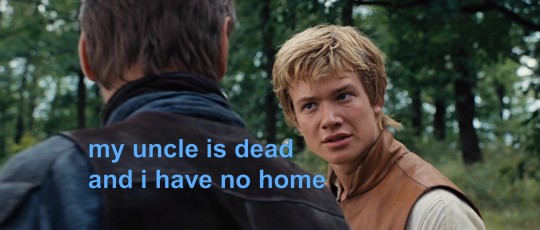
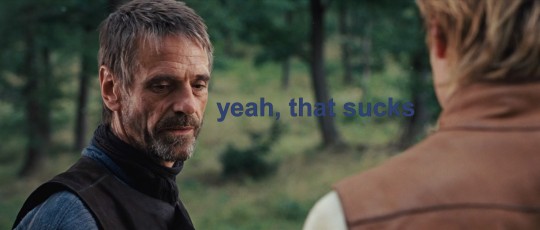


That’s it for Part 4! So many of the events in this segment could be summarized as “they argue a bunch, someone gets offended, also there’s exposition?” and it was hard to strike a balance between information, commentary, and brevity. I hope the end result is still fun to read. This part covered about 12 minutes of screentime. That’s the longest one yet, by quite a margin! I sure hope we’re past the halfway point on the expository infodump front. But only time will tell, and it will probably do so in a dense and uninteresting fashion.
Remember to tune in next week when we visit such questions as “what are Carvahall’s legal consequences for agreeing on things?”, “how long will it take Eragon to teach Brom that logic is meaningless?”, and “is Saphira secretly a radioactive spider?”. See you then!
#eragon#inheritance cycle#eragon movie#so much bickering in so little time#eragon movie recap#eragon shadeslayer#brom#saphira#ra'zac#sloan#garrow#long post#sorry mobile users#mod zar'roc
86 notes
·
View notes
Text
Aside from going to the movies as much as possible I do love a chill night in with good ol’ Netflix. With the ENDLESS amount of content on the streaming service, Netflix also loves putting out their own original movies and T.V. In between my trips to the theatre I just so happened to be able to catch a movie here and there throughout the year and like last year, here are the list of movies l watched with a brief review of how they turned out in no particular order.
Okja
picture via pinterest
picture via slashfilm.com
Starring Tilda Swinton and Paul Dano
An exceptional adventure of a little girl named Mija risking everything to rescue her best friend, a remarkable animal named Okja from a multi-national company. I found this movie to be exciting, fantastical, and touching friendship story with a satirizing message regarding the food industry. With comic and over the top performances from everyone involved including Jake Gyllenhaal, you will fall in love with the lovable Okja.
3 ½ out of 5
I Don’t Feel at Home in This World Anymore
picture via imdb.com
picture via mistfts.com
Starring Melanie Lynskey and Elijah Wood
This dark comedy involving a woman whose home was burglarized and gets inspired to find the people who did it with the help of an eccentric and obnoxious neighbor. As they dig deeper they get entangled in a much bigger situation they are clearly not prepared to handle. This movie is not bad. I liked the wit of the script. Since it is a comedy, there are a lot of bumbling criminals running around the movie but I think the self help the depressed lead is going through is interesting enough to keep it realistic and a little relatable to anyone who feels like they get shit on every day and just can’t get a break. Check this out if you feel like something indie to watch. A comedy with a bit of substance.
3 out of 5
Naked
andcompany.com
picture via consequenceofsound.net
Starring Marlon Wayans and Regina Hall
With no explanation given at all, Marlon Wayans plays a man who happens to be caught in a time loop repeating the day of his wedding to his fiancé. Not only that, he wakes up completely naked. Only he remembers his previous day and must find a way to make it to his wedding and marry the woman he loves. The concept is nothing new you haven’t seen before and unfortunately, the hijinks were a bit too silly to be taken seriously. Yes, it is a comedy but it has to be funny and somewhat real even for comedy sake. No real interesting characters. Marlon is charming but he was given a horrible script to work with. Its an okay watch but once it is over you will forget you watched it.
2 out of 5
Little Evil
picture via imdb.com
picture via hypable.com
Starring Adam Scott and Evangeline Lilly
A horror comedy spoof of The Omen a man marries a woman with a 6-year-old son of her own. Typical modern family except that he believes the is might be the antichrist. I love the concept and Owen Atlas who plays the devil’s child is great in it as the brooding evil incarnate. Evangeline is funny as the naïve mother unaware of her son’s true destiny. Packed full of other known standup comedians and T.V. actors this has a bit of humor that keeps you engage but as the movie progresses it gets way too silly and a little boring. This is one I think can be scrolled pass but if you like the actors associated, give it a shot. What do you have to lose? Your soul?
1 ½ out of 5
Take the 10
picture via imdb.com
picture via imdb.com
Starring Josh Peck and Tony Revolori
A comedy involving two friends who plan to make a big change in their life has to tie up loose ends when a drug deal goes bad. All taking place in one day, this movie is told in interwoven shorts from the perspective of a different character each time covering the same 24 hours. This movie would actually be worth recommending but the characters are not likable at all. In fact, one of them is just a straight up asshole who is too narcissistic for his own good. The Y generation may find this enjoyable and relatable as well as anyone who lives or knows southern California well to understand the joke within the title. It wasn’t boring just not a great movie.
3 out of 5
iBoy
picture via imdb.com
picture via inuth.com
Starring Bill Milner and Maisie Williams
Trying to capture on the superhero fad, a young boy is given the ability to control anything technological. Of course, no superhero with powers are created without a tragedy. He gets these abilities because pieces of his cellphone were implemented into his brain after being shot in the head while on the phone. Discovering his new gifts, he uses them to save his crush and take back the neighborhood that is being controlled by a mobster and his goons. This idea is about as bonkers as it sounds. It actually attempts to try and be a serious authentic crime drama. The acting is par and the movie isn’t slow. The way he uses his abilities is creative but this story is a stretch to be taken seriously. For you Game of Throne fans out there that want to see Arya Stark out of her war garment then check this out, otherwise, this is a movie you don’t need to see.
2 out of 5
#realityhigh
picture via imdb.com
picture via dailydot.com
Starring Nesta Cooper and Keith Powers
Combine the color and upbeat acting of Disney and the updated and modern teen experience of Freeform and you got yourself a high school comedy. This one involves a high-achieving high school girl who is supposedly someone who isn’t beautiful to get the man of her dreams because she wears glasses witnesses her crush dating someone who is the center of a reality tv show that follows her around. Through certain circumstances she is drawn into the world of being popular and getting everything, she wants but also risking losing the very thing she didn’t believe she had the whole time. I actually enjoyed watching this teen flick. All the characters were very likable, they all had brains and had a voice and it seemed that everyone got their fair share of screen time. I actually see this show being a great series. At the end of the day it is a cheesy teen flick that makes millenials look like technologic narcissistic zombies. If they decide to do more of these following up what happens next, I wouldn’t object. Honestly, if you watch the trailer and have interest in watching it, check it out.
4 out of 5
You Get Me
picture via imdb.com
picture via netflix.com
Starring Bella Thorne and Halston Sage
A thriller in the same vain as A Fatal Attraction, Swimfan, and anything involving a love affair turned deadly. Bella Throne is the new Glenn Close in this teen suspense movie when she has a one-night stand with a man who recently broke up with his long-time girlfriend. After a weekend of sex and cuddles, he tries to get back with his girlfriend realizing what he lost and she decides that he is the new love of her life and will destroy anyone that gets in her way. This movie was a little cheesy as some of the actions carried out seemed to unreal to be carried out. I don’t really feel sorry for the victim or protagonist of the movie. These movies tend to bug me sometimes with the idea that a woman can’t go without a man. Just think if this movie was Twilight and Stewart’s Bella went all postal in addition to her obsession with Edward. If you are a fan of Bella Thorne, check this out. If not, this is the same ol’ same ol’ tale.
2 out of 5
1922
picture via wikipedia.com
picture via basementrejects.com
Starring Thomas Jane and Molly Parker
The Stephen King adaptation of his novel 1922 sees a prideful father and farmer who is having financial troubles keeping his farm afloat. His wife wants to sell but he is to proud to give it up. Convincing his son to participate, they plot to kill his wife to make sure they can keep the farm. The outcome is far more than they would imagine. Paranoia, deceiving, and ghostly visions and dreams plague the father and son who try and keep up the charade that their mother just disappeared. Haunted by their crime the movie gives off a thrilling ride to possible insanity. This movie is more drama than horror and more depressing then suspenseful. Doesn’t mean this movie wasn’t good but just know that this movie may not be what you think it is. If you want to see a gut-wrenching story and the desperation of what one man would do to keep his livelihood, you may enjoy this film.
3 out of 5.
The Babysitter
picture via wikipedia.com
picture via bloodydisgusting.com
Starring Samara Weaving and Judah Lewis
This horror comedy is one of the best horror films in 2017. It is silly in a McG sort of way but has a lot of heart in it. This movie has everything: cults, bullies, spiders, shirtless hot guy, blood sacrifices, deflating implants all wrapped up in a big bow with McG’s signature stamp on it. That can only mean you are in for a bizarre, twisted, and funny flick mixed with some jump scares, some cool kills and the laws of gravity are thrown away because it’s McG. I love the cast and they played likable characters. This will make you laugh and there is a lot of blood. I think the script is clever and the friendship between the babysitter and her charge is the best part. A slow start in the beginning but once it happens it doesn’t stop.
4 ½ out of 5
Gerald’s Game
picture via wikipedia.com
picture via fhm.com
Starring Carla Gugino and Bruce Greenwood
An adapted Stephen King novel adapted for screen was one of the best ideas in 2017. I have never heard of this novel before and it is terrifying to watch. What a well done film with suburb acting from Carla Gugino who is at a cabin with her husband trying to spice up their relationship but due to unfortunate events she is put through the most brutal mental test to find out if she has what it takes to survive. This was a gut-wrenching edge of your seat one woman show. It will have you spooked, bewildered, and any other intense feeling you can think of. I highly recommend this film and towards the end you will witness one of the most painful look away scenes of 2017.
5 out of 5
If you would like to read a full review of What Happened to Monday and Death Note, click here and here.
There are more to be seen and eventually I will get to more. Which Netflix movies did you watch in 2017? Comment below with your favorites and ones that were just the worse. Thanks for reading and I’ll see you at the movies.
title photo provided by vancouvereconomic.com
Netflix Original Movies 2017 Aside from going to the movies as much as possible I do love a chill night in with good ol’ Netflix.
0 notes
Text
Why Rebooting is bad and why continuity actually matters
A noteworthy individual in the realm of comic book podcasting by the name of Michale Bailey has stated on more than one occasion that Spider-Man could use a continuity reboot.
Let me explain in a 5000+ word essay why this is so wrong.
To begin with full disclosure on Bailey.
Bailey is a DC fan. A MASSIVE DC fan. He’s a Superman expert and his fav villain is Joker.
He likes Marvel but in a very secondary way to DC. His favourite Marvel characters are Hulk and Captain America. He likes Spider-Man but is no expert on him and is nowhere near as passionate about him as he is Superman.
The problem with him and many DC fans who are so quick to advocate for a reboot for various Marvel characters is that they ignore important context.
To begin with I honestly do not think most people who are DC fans first and foremost understand the value Marvel fans place on continuity, or at least they themselves do not place as much value by it.
From ground zero of the universe it was made clear continuity mattered. If the Marvel Universe was the United States then alongside relative realism and human flaws an attempt at good continuity would be part of the Bill of Rights.
I think the reason DC fans are more quick to dismiss continuity or the value Marvel fans’ place in it is because for DC continuity means far less, far less to the point where it has honestly become meaningless.
Continuity over at DC meant only as much as any given writer cared about it for the longest time. William Moulton Marston might’ve given the Baroness a redemption arc in his Wonder Woman run. Alfred Beagle’s transformation from a tubby clean shaven guy into a lean, moustachioed gentleman might’ve been explained via him going on dietary vacation. DC might’ve been inspired by fans’ letters to explain Barry Allan reading a Jay Garrick comic book via the establishment of Earth 1/Earth 2.
But all these were loose exceptions. Marston was putting in more effort than his peers of the day. DC were mandated to change Alfred’s appearance but didn’t bother to explain his name changing from beagle to Pennyworth which happened arbitrarily. And whilst DC established Earth 1 and Earth 2 they only did so because fans kept asking them what the deal was, when Barry Allan debuted they did just casually ignore the fact that Jay Garrick had existed in the way he did.
Day-to-day though consistency and continuity, the attempt to make the stories one big narrative was arbitrary at best. Superman was suddenly Superboy in his teen years and s an adult went through dozens of new powers that showed up and got dropped just as easily. Each story didn’t matter to the next one and could be read in any order regardless, etc.
DC only started trying to get deeper with continuity pretty much as a RESPONSE to Marvel emphasising continuity from 1961 onwards.
And event his was clumsy and problematic due to their long history of NOT doing that, meaning their universe was adopting continuity and trying to pretend those rules should all of a sudden apply to a universe that up until then was anethma to it.
It’d be like if the Simpson suddenly tried to apply legitimate Marvel style continuity after all the years of Homer having a million jobs and the family going through all these zany experiences that reset by the start of the next episode.
Where continuity worked for DC it did so in tittles like Swamp Thing or Teen Titans where there was a comparatively cleaner history to work with, where continuity might not have strictly speaking existed but where it also hadn’t been as aggressively ignored either.
Unsurprisingly then when it came time to reboot the DC Universe with Crisis on Infinite Earths that the Titans history was retained mostly unchanged (though their writer Marv Wolfman also writing Crisis probably had something to do with that too).
Crisis on Infinite Earths was done EXPLICITLY to reorganize the DC Universe to better resemble the Marvel Universe and having a greater sense of continuity was a MASSIVE part of that.
Suddenly Superman’s history was streamlined and events in his life followed a greater degree of cause, effect and repercussions as opposed to the rotating door of arbitrary stories that can be read in any given order because the status quo would snap back come Hell or high water anyway. Suddenly he and Lois relationship had a flowing narrative where one event could impact the next building and building until they were dating, then in love, then engaged, then married.
The same generally held true for most of the DC universe, in fact the Universe as a whole now had a greater degree of cohesiveness as the Earth 2 heroes like the Jay Garrick Flash were established as existing in the 1930s and 1940s with the more iconic characters like Superman, batman, Wonder Woman and Barry Allan’s Flash having come in as the next generation of heroes as opposed to there being an arbitrary invisible line where everyone transitioned from Earth 2 into Earth 1.
Now the question to be begged is...WHY did DC feel the need to reorganize their universe in this way? Why did they feel the need to tear their house down and rebuild it in a style more similar to their competitor’s?
Because...their competitor was doing better than them that’s why.
Between 1961 when the Marvel Universe began and 1985/1986 when Crisis on Infinite Earths unfolded, more often than not Marvel DOMINATED DC.
And since continuity was a big part of that DC opted to hit the rest button and essentially do a second draft on their characters and their universe taking into account the lessons they’d learned from Marvel’s success, continuity being one of the biggest of those.
I believe it was Mark Gruenwald who used to joke that Marvel didn’t need to reboot their characters like DC did because they ‘got them right the first time’.
And to a large extent...he was absolutely right, and Crisis on Infinite Earths is a testament to that.
And one of the biggest reasons why is because DC DID improve their sales. And I do not just mean they improved them because of their new spat of #1s or the EVENT that was the rebirth of their characters. I mean by the late 1980s and early 1990s their characters were competing far better with Marvel than they had done before. Though still in second place more often than not.
But there were still problems with their universe, ramifications of rebooting that made things muddled and confusing in ways they hadn’t been before. Hawkman is the most talked about example of this to the point where I don’t even know how to explain what the contradictions are. Same story with Power Girl and Donna Troy who’s histories and origins became so convoluted that they were the subject of jokes in and out of the comics. Donna Troy’s history was such a mess there was even a story made to specifically try (and in my opinion failed) to resolve the clusterfuck her very existence had mutated into.
DC decided to clean things up a little with Zero Hour and do a less extensive reboot of their universe. Everything set up via Crisis on Infinite Earths mostly stayed the same apart from a few things.
That was the first warning sign though. The first sign that the universe they’d rebooted into existence was not structurally integral precisely because they’d rebooted it into existence.
Then came guys like Mark Waid, Dan Didio, Mark Millar, Goeff Johns and Grant Morrison and so many others, children of the pre-crisis DC universe (specifically the continuity toxic Silver Age) who were upset at it’s destruction and being replaced by the post-Crisis DC Universe.
In their works and under their tenures much of the Silver Age was in one form or another reintorduced into the post-crisis DC universe created very specifically to exorcise most if not all of that stuff.
Barry Allan, Kara Zor-El, Kandor, etc. Shit, Grant Morrison did the acclaimed All-Star Superman series from 2005-2008 which was flagrantly a love letter to the whacky Silver Age Superman stories of the 1950s and 1960s. That was out of continuity but Mark Waid went further by kinda sorta said that Superman hung out with the Legion of Superheroes in his teen years, something very explicitly exorcised from the post-crisis version of Superman.
Was this a case of these creators simply subconsciously drawing upon their childhoods?
Nope, not even a little bit.
They were very consciously and very deliberately trying to in some way shape or form resurrect the characters, elements and universe they had known and loved and apply it to the version of the universe that had in effect killed and replaced the one they’d known and loved.
They didn’t even try to cover this up.
I believe it was Dan Didio who once said he and Geoff Johns almost entered DC comics specifically to bring back Hal Jordan and Barry Allan.
And Mark Waid even as late as 2008 when he was interviewed about Brand New Day has stated that he felt extremely upset over losing the pre-crisis Superman who was replaced by the John Byrne post-crisis Superman.
Legend has it that not long after the post-crisis era began he even asked Byrne (or someone from DC) about ‘when the real Superman’ would come back.
Hell he did Superman Birthright a story that out of the blue gave use yet another new spin on Superman’s origin that was different to John Byrne’s post-crisis take on the character’s origin, though DC didn’t outright say one was supplanting the other.
They were not alone.
Brian Meltzer stated in regards to his Identity Crisis storyline that he loved the Silver Age of the DC universe despite people proclaiming it to be silly garbage.
Neil Gaiman in a one off Batman story he did made a meta commentary proclaiming his love for the Adam West Batman show.
And, though he didn’t work much in the post-crisis DC universe, acclaimed author Alan Moore took Image comics character Supreme, who was created essentially as a Superman rip-off, and proceeded to even more flagrantly rip-off Superman by morphing Supreme into Silver Age/pre-crisis Superman. Supreme like Superman even had a younger female family member and a super dog. They might not have been beat for beat Supergirl and Krypto, but it was obvious that those were who they were meant to be. He’s even been known to have said that the post-crisis Superman ‘ruined’ what Superman was supposed to be.
The love for the pre-crisis Silver Age had to varying degrees rubbed DC fans the wrong way but they didn’t know what they were in for because in 2006 DC unleashed Infinite Crisis.
Like Zero Hour this was a storyline that rebooted elements of the DC Universe but not as extensively as Crisis on Infite Earths had, though it was nevertheless far MORE extensively than Zero Hour.
How in love with the pre-crisis era and the Silver age was Infinite Crisis?
Well it reinstated the Multi-verse and Earth 2, two explicitly silver age concepts that were equally explicitly removed by Crisis on Infinite Earths.
It swept aside all of Power Girls various history since Crisis on Infinite Earths and just stated she was Superman’s cousin, but not the post-crisis version. She was literally the exact same pre-crisis version of Power Girl who (it was explained) had simply surived erasure during Crisis on Infinite Earths.
It brought back notable pre-crisis characters like Superboy Prime, Alexander Luthor oh and the Earth 2 Lois Lane and Superman who, I will remind you, were literally supposed to be THE Superman and Lois Lane from ACTION COMICS #1!
Then as part of the ramifications of the continuity changes instituted by Infinite Crisis Superman’s history was once more reworked to now explictely reintegrate his silver age history as Superboy and membership with the Legion of Superheroes as well as Lex Luthor knowing him in Smallville.
Yeah, it was pretty obvious what was happening. The guys in charge missed the pre-crisis days of DC and were trying to bring it back.
And this is the crux of why REBOOTING DOESN’T WORK.
The argument from people like Bailey is that if creators like this didn’t try to recreate their childhoods like this and remained committed to the rebooted universe established when they walked into their jobs the rebooted universe could work.
Except reboots by their inherent nature make that possibility extremely unlikely if not outright impossible.
Superhero comic books are a medium in which the reader pays money at least once a month for years-decades following the lives of the protagonist characters in a greater degree of detail than pretty much any other medium could muster.
Much like novels comic books go inside the characters heads forging a personal connection between them and the reader the likes of which is less likely and less frequent than with TV or film characters because that degree of intimacy is rarely present.
However unlike novels comics do this not only to multiple characters at a time but also get published more frequently.
As much emotional investment the average readers might have in Hermione Granger and Ron Weasley or Neville Longbottom, the fact is because they are not characters who’s heads we inhabit to the same degree as Harry Potter’s meaning there is less likely to be as personal connection forged.
This isn’t the case in comic books where we do, to lesser degrees, inhabit the head spaces of supporting cast members and even villains very, very frequently, meaning readers on average have (compared to the Harry Potter characters I listed) likely a greater degree of investment in characters like Foggy Nelson, Mary Jane Watson, Lois Lane, Alfred Pennyworth, Robin, etc. It even applies to villains even if the readers obviously do not feel sympathy for those characters.
And that form of intimacy between characters and readers happens across a mimimum of a month to month basis, not maybe once a year if a novel series is really on it’s game.
Consequently comic book fans moreso than in any medium, even daily shown soap operas, follow the metaphorical LIVES of these fictional characters.
And unlike soap operas they have to pay an inordinate amount of money for the pleasure of hanging out with those characters that they have that connection to.
So when a reboot comes along and essentially DELETES those characters and at best replaces them with new versions who aren’t the same in various ways it is the equivalent of taking away your beloved friend or pet and presenting you with a new friend or pet who’s sort of similar but obviously not the same thing you knew and loved, but asking you to accept them all the same.
And there are major ramifications to doing that have very long term ripple effects.
The most obvious one being that companies will LOSE the business of the old fans, which is exactly what happened with the New 52.
But more poignantly it is a veritable GUARANTEE that old fans will become VERY embittered and seek to in some way restore the characters they knew and loved, often by tearing down or warping the things that erased and replaced them.
At the same time erasing and replacing one version of the characters and universe with another sets a dangerous precedent even for creators who do NOT have an emotional connection to bygone eras.
That being that it can be okay to erase and replace things whenever they damn well please.
Or to put it another way...nothing matters.
The problem being the inherent nature of the comic book medium REQUIRES the readership to care.
It REQUIRES that emotional intimacy and connection to grow and be maintained in order for them to keep coming back and wanting to follow the lives of the characters.
And when you make it clear that whenever convenient everything you’ve spent time, money and emotional energy on can be utterly invalidated what is the point of bothering at all.
Now I know the argument would go ‘but for NEW fans that isn’t the case’
Except it is.
The halcyon days John Byrne likes to wax lyrical about when the readership would rotate every five years are DEAD and they’ve BEEN dead for decades. They died essentially the moment Marvel instituted continuity.
Because in instituting continuity it actively encourages people to CONTINUOUSLY read the series and follow the character.
Marvels’ success and DC’s greater success post-crisis have PROVED that that creative model is simply more popular and profitable than operating under the idea that the readers invest for a little while before they notice the illusion, that nothing matters and then consequently leave to be replaced by new people who’ve yet to notice that.
But in this day and age trying to maintain that illusion is not just a mountain to climb, it’s downright financially irresponsible.
We live in an age where the average audience member for any given piece of media is intrinsically more genre savvy than they were 20-80 years ago.
An age where there are countless instantly accessible websites discussing storytelling quirks and mechanics, where there is a whole website called TV tropes detailing every trope in storytelling known to man and giving vast EXAMPLES of them within popular stories.
An age where there are highly popular internet reviewers who deconstruct and point out those tropes thus training up their audience to spot them too.
And if you think they’re just over in a little corner think again.
Before his death notable film critic Roger Ebert recognized the work of the Nostalgia Critic who has won awards for his internet based awards show.
The acclaimed TV series Community actively engaged with the TVTropes website when writing it’s episodes, laying layer upon layer of meta commentary upon almost every episode and being hailed as the most genre savvy show on television.
The filmmakers of the Winter Soldier and Civil War movies took note of the internet series ‘How it Should have ended’ in order to make the resolution of their movies as watertight as possible.
The director of Kong: Skull Island went on a rant about a popular internet video series that pointed out problems in his movie and he even guest starred on another similarly popular internet series to point out further problems with the film in person.
Combine the above with the existence of trades, internet resources, info books and just discussions about comic books on social media and podcasts and the notion that most if any potential new readers are going to be fooled by the illusion that the comic books they are financially or emotionally investing in actually matter becomes less and less likely by the day.
Hell I was a kid with little internet access who wasn’t a big DC guy and who hadn’t read Crisis on Infinte Earths but I KNEW about it.
The rebooting of your universe is such a huge colossal thing that it’s something that comic book fans pick up on very quickly upon entering into the hobby just via osmosis.
That was in the days when the internet wasn’t what it is now, so the notion that you can trick new people into not realizing the stories they are investing in can be thrown out the window at any moment is ludicrous because they WILL know about reboots very quickly.
Sure, you could argue that the relative success of the post-crisis era proves that even KNOWING about reboots as a potential phenomenon doesn’t mean that they won’t be successful so why NOT do them?
Because again, I think that ignores the context of the time period.
I don’t think MOST people (even the creators involved) actually realized or had the mentality that reboots could be a recurring phenomenon.
I think fans and creators alike entered into the post-crisis era truly believing that Crisis on Infinite Earths was a one off affair and now that the DC universe had been ‘fixed’ or ‘realigned’ or whatever you want to call it, that was that. It wasn’t going to happen again. Sure there was Zero Hour but that was to clean stuff up and reinforce the new universe they’d made, not a desire to scrap what’d come before. It was a patch up not a clean slate deal.
In a sense Infinite Crisis was a testament to this. It demonstrated a desire to reboot again but also a sense that it was somehow taboo to do so thus it didn’t go all the way.
But then in 2011 we got the New 52, something that J. Michael Straczynski has stated Dan Didio had wanted to do for years. And if you pay attention to it you will see more than a few pre-crisis elements present in it. Wonder Woman’s mother being blonde haired. Superman being single and a lonely alien. Few if any legacy characters, etc.
The new 52 was the most extensive reboot SINCE crisis on infinite earths and it so colossally backfired that in 2016 DC launched Rebirth which has since then been essentially transforming the New 52 BACK into the post-crisis era.
And whilst yes a major reason for that was the overall poor quality of the universe, the fact is another major reason was that same invalidation of reader emotional investment made worse by the further erosion of the illusion that the stories matter.
If the post-crisis era that lasted almost 30 years could be swept away so casually, why give a damn about anything the new 52 had to offer? Why give a damn about this universe when Dan Didio EIC of DC STATED that he feels that there SHOULD be a reboot every so often, that the stories you have spent time, money and energy on in the here and now SHOULD be erased and invalidated.
It was demonstrable of a fundamental misunderstanding of why the modern comic book reader of the last 50 or so years picked up a book. They weren’t looking for a disposable adventure, they were LOOKING to emotionally invest. The ball game had intrinsically changed in the 1960s thanks to Marvel and largely thanks to their institution of continuity, flawed as they hemsleves might have been in applying it at times.
Again, thing is part of why we got Rebirth. It’s called REbirth for a reason. It’s because the world and universe that is coming out of it is like the one people knew and loved.
Superman is again the most poignant example of this as his history via DC Rebirth has been nce more changed but this time changed BACK into what it was more or less just before the New 52.
I think that for a lot of fans there is a HOPE with Rebirth that DC have actually now recognized reboots as destructive and that they are now endeavoring to reorganize their universe back to what it was and, as was the case post-crisis, honestly leave it that way. Hope for this recognition is corroborated by the in-universe meta-commentary by the cosmic entity Metron during the Convergence storyline, during which he more or less said the DC universe cannot survive another reboot and then sent heroes to outright prevent Crisis on Infinite earths from ever happening, literally preventing the first ever reboot from happening and thereby all the ones thereafter.
DC at the time of this writing are doing great. Depending upon who you ask they are even financially beating Marvel and DEFINITLY creatively kicking Marvel’s ass.
However throughout the ups and the downs I’ve listed with DC the fact remains that Marvel more often than not have always trumped them in sales.
There have almost always just been more people who want to read and financially and emotionally invest in Marvel’s characters and universe than DC’s. You can’t handwave that off on the success of media adaptations either. Marvel’s media dominance didn’t truly begin until 2000-2002 with X-Men and Spider-Man and prior to that DC had a larger number of higher quality cartoon shows like Batman and Superman the Animated Series, the former of which even got shown on Prime Time.
And yet Marvel continued to trounce DC most of the time and among it’s highest sellers, among the franchises which routinely beat MOST of DC was...Spider-Man.
Spider-Man who’s whole concept was for him to be relatable, that is to say his whole concept was actually BUILT around the idea of making you the reader emotionally invest in him. Whilst Batman and the Fantastic Four might’ve held that ambition generally speaking for Spider-Man it was intrinsic to who he was, he was MADE to be like (what Stan Lee believed was) the average reader (relatively speaking).
And then...you followed his life.
There is perhaps no character in Marvel’s history who’s life has been AS detailed and fleshed out as Spider-Man’s.
He has no dark mysterious past like Wolverine or Deadpool.
His story didn’t begin with him as an adult who’d lived a long life upon his debut like Reed Richards or Bruce Banner.
And he wasn’t a member of a team, but rather the lead in his own right unlike the Human Torch or any given member of the X-Men.
Consequently what we got was a character who debuted with you knowing almost everything about him. he hadn’t lived long enough to HAVE a past of mystery or life experiences you could pull out the bag for big flashy reveals. And the story was DEVOTED to his life and his journey of growth.
All of this has led Spider-Man to being both the most (relatively) realistic character in Marvel’s canon and the one who encourages the most emotional and thereby financial investment.
Because not only are you supposed to identify with him but you can honestly watch him grow up, you can watch him evolve even alongside yourself and see him hit life milestones we all are familiar with even if we have not ourselves hit them.
And just to prove that it was no fluke Marvel created a wholesale second version of Peter Parker in the form of Ultimate Spider-Man and succeeded in the same experiment AGAIN.
But following Peter’s life, his development and emotionally investing in him REQUIRES continuity to be intrinsic to his narrative. It is a REQUIRMENT that within the fictional realm he inhabits there is to a large extent a sense of cause and effect and a forward moving passage of time.
Continuity reboots DESTROY that because they rip out a character’s past and make it clear to the readers that the cause and the effects are illusionary and don’t actually matter.
Couple that with the greater degree of emotional investment Spider-Man’s story encourages and rebooting him would be positively disastrous.
And that’s not even a hypothetical.
It proved disastrous when they rebooted him IN FILM a mere five years ago and even his soft reboot from 2007 has had vast damaging ramifications for the fanbase. Not AS bad the new 52 because the fanbase still holds onto the idea that something like OMD won’t happen again. But realistically the precedent has been set now.
Now sure...you could flip the script on some of what I said. You could argue that OMD is representative of how, continuity or not, reboots or not, creators will always reinvent their childhoods come hell or high water so why NOT reboot?
The answer being that when you have a continuity driven narrative that HASN’T had the precedent of rebooting it established creators recreating their childhoods nevertheless becomes more difficult and becomes less likely and easier to fix by writers who aren’t blinded by their nostalgia goggles.
Case in point, Marv Wolfman didn’t ACTUALLY put Spider-Man back into High school.
Dan Slott didn’t LITERALLY have him date Deb Whitman again.
Joe Quesada didn’t ACTUALLY go through with resurrecting Gwen Stacy, even though he came damn close.
Shit even with One More Day Marvel tried to sort of compromise between removing the marriage and just erasing those stories outright by (falsely) claiming every story happened the same way except they happened to not be married. They TRIED to keep as much continuity as possible. They even made a point of resurrecting Harry Osborn in a way that didn’t just Crisis style reboot his history, but in-universe explained his resurrection.
Why?
Because they KNEW there would be vast negative ramifications if they did anything more extensive.
Oh...and because they KNEW continuity was an important part of storytelling and financially profitable.
Like...their whole company was testament to that.
And wider pop culture corroborates that.
Soap operas.
YA novels like Harry Potter and Hunger Games
Telenovels such as Breaking Bad, Game of Thrones, Once Upon a Time, the Sopranos and House of Cards
Children’s shows like Adventure Time and Steven Universe
Every manga and anime series that has on balance been more successful than most DC or Marvel comic book series...which on balance is MOST manga and anime
The Marvel Cinematic Universe
Oh and the DC Animated Universe!
All these things have intrinsically involved continuity and found varying degrees of success. Whether it’s a reliable money spinner like daytime soap operas or vast critical acclaim and billions of dollars like the MCU, continuity has been one of the vital elements to ALL those things.
Now the arguments when it comes to at least Spider-Man specifically, is that a reboot can be a good thing because you can sweep away the bad stuff right?
Except most of the time the stuff you consider bad, even if it IS bad, is beloved by SOMEBODY.
Speaking from experience her I’d love to just erase Spider-Man from 2005 onwards but I’d never do it if I had that power because I know people love what has come since then, so I’d try to mind a compromise between what I want and what they like.
And I’d do that WITHOUT erasing and supplanting anything via a crisis style reboot because, as I’ve detailed, it simply plants the seeds for long term erosion and destruction.
It’s not even necessary.
Perhaps the single biggest clusterfucks of the 90s were the Clone Saga, Avengers the Crossing/Teen Tony Stark and Heroes Reborn.
All those stories created massive, ugly confusing messes for those characters.
It would’ve been so, so, so easy to just hit reset and delete those things but Marvel didn’t do that.
Instead they found in-universe solutions to fixing the problems. They in-universe made Peter Parker Spider-Man again and explained everything about the Clone Saga. They in-universe restored the original Tony Stark and fixed what they’d broken about him. They in-universe brought the Avengers and F4 back without rewriting their histories.
So all the problems Marvel and Spider-Man might have developed CAN and SHOULD be resolved IN-Universe as opposed to employing a cosmic rest button.
Finally I’d like to quickly address the argument (another on favoured by Bailey and DC fans) that the failure of the New 52 and most reboots was that they were not ‘clean breaks’.
That is to say that the New 52 COULD have worked if only stuff like Batman and Green Lanterns’ histories had also been begun from scrtch as opposed to retaining most of their pre-rebooted stories.
This is a patently nonsense argument when one considers that y this logic, the post-crisis era was itself not a truly clean reboot either.
Batman post-crisis actually DID retain a lot of stories from his pre-crisis self including most of Denny O’Neil’s iconic work on the character. Not to mention the fact that Dick Grayson had for years and years operated as Batman’s sidekick Robin.
Gaps were left in Superman’s history that allowed readers the flexibility to image certain pre-crisis stories happened during them, including all those times Lois Lane suspected and tried to prove Clark Kent was Superman.
Barry Allan despite dying in Crisis on Infinite Earths and beginning the post-crisis era as a corpse, had SOME kind of long history as the Flash (presumably one similar to his pre-crisis self) that led to him being the inspiration for his sidekick Wally West to become the new Flash.
And as mentioned the Teen Titans/Titans histories, especially as a team, were almost entirely retained going into the post-crisis era to the point where (much like Green Lantern and Batman in the new 52) they began life in the new rebooted DC universe as essentially a continuation of the storylines and big picture narrative that had been going on before the reboot.
When you think about it, there was maybe even less of a clean break for the post-crisis era as there was for the new 52 so the notion that it’s failure as a rebooted universe owed much to it not rebooting ENOUGH is ludicrous.
So...What are my over all points in all this?
· Continuity actually IS important, it’s not just a fan concern. Continuity is intrinsic to developing characters and world building, setting up stakes and over all building emotional (and thereby financial) investment for the audience.
· Reboots are toxic to this and form short term solutions that create far worse long term problems
· DC’s near perennial second place next to Marvel owes a lot to the lesser value DC places in continuity
· A reboot would be especially toxic for Spider-Man who, more so than any other Marvel character, really does NOT need one.
#Marvel#marvel comics#dc#dc comics#Spider-Man#Batman#Peter Parker#DC animated universe#dcau#mcu#marvel cinematic universe#new 52#nu52#dc new 52#dcnu52#Superman#Clark Kent#Lois Lane#Image#image comics#supreme#Crisis on Infinite Earths#convergence#Infinite Crisis#Power Girl#DC Rebirth#the flash#flash#barry allen#Wally West
49 notes
·
View notes